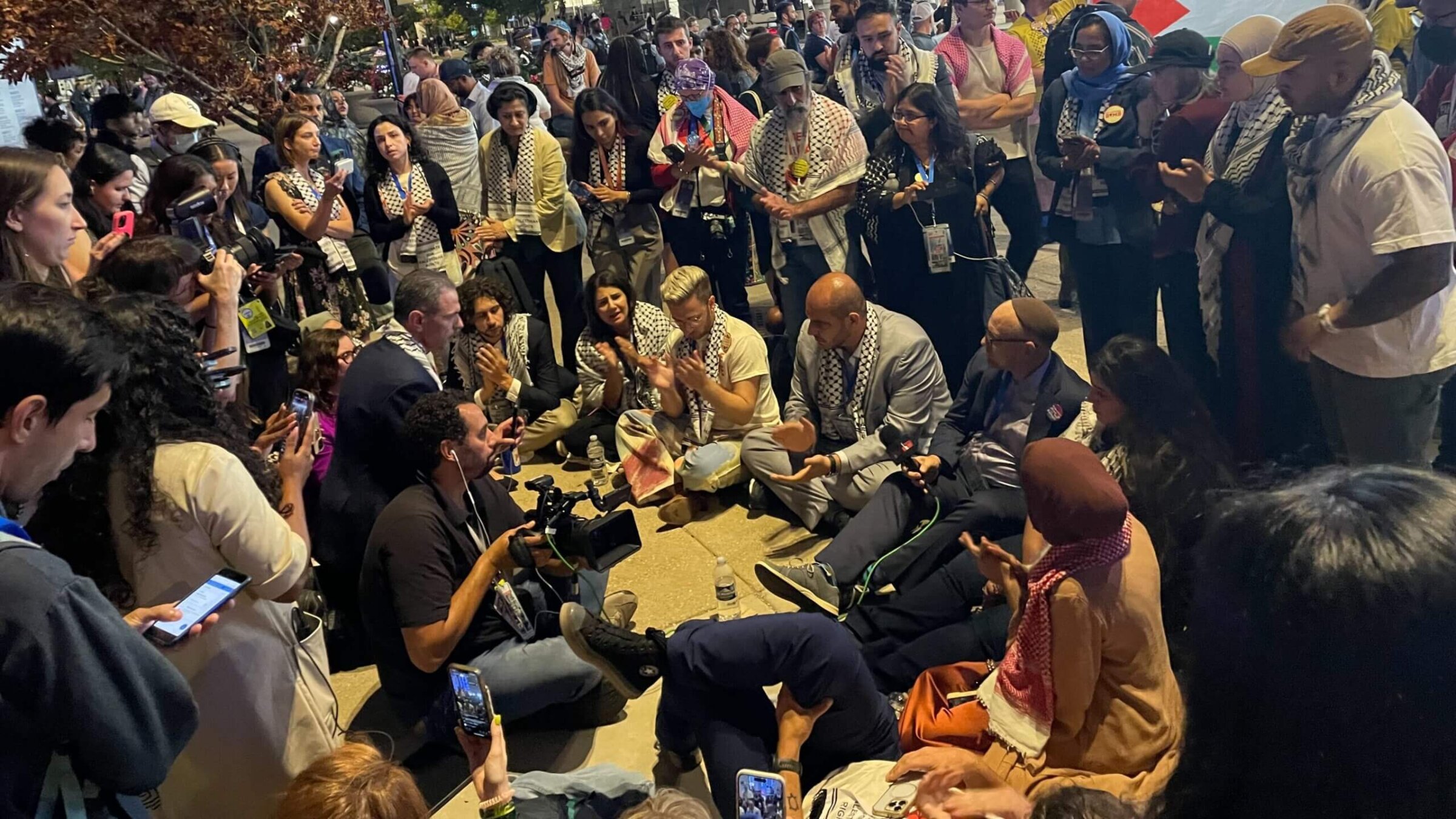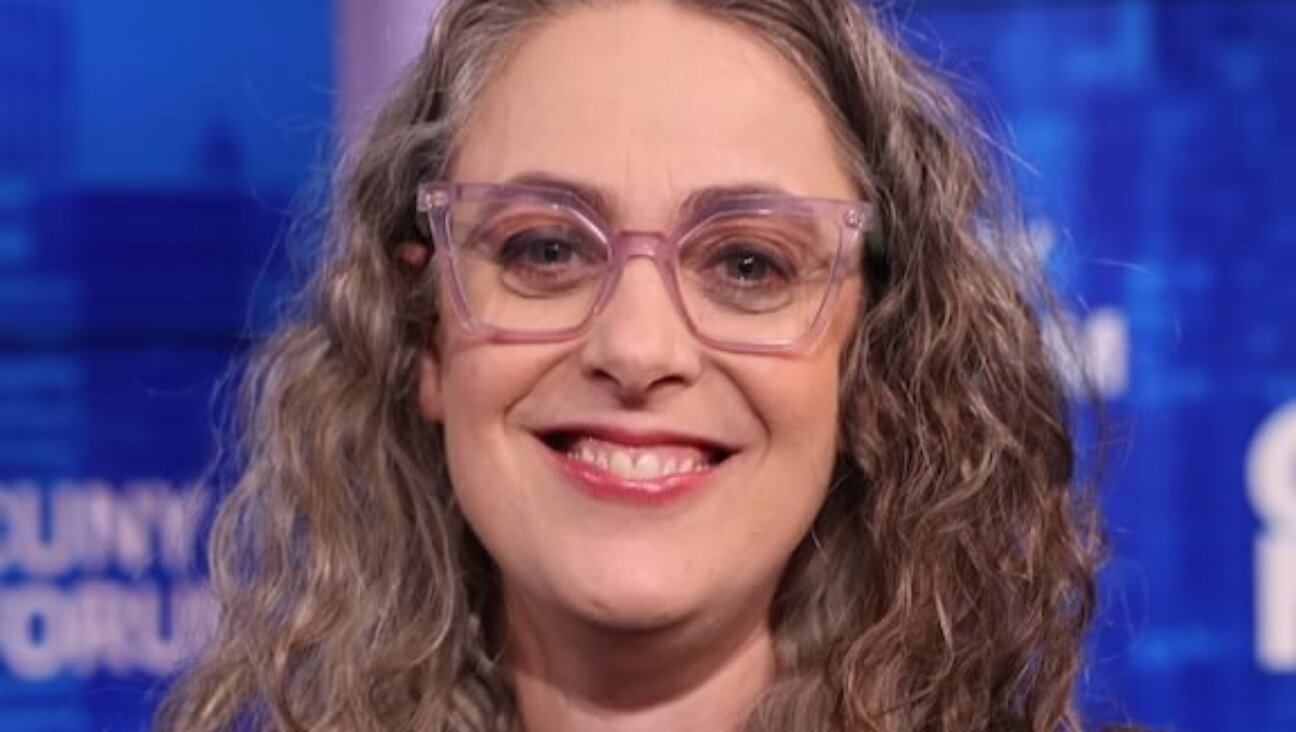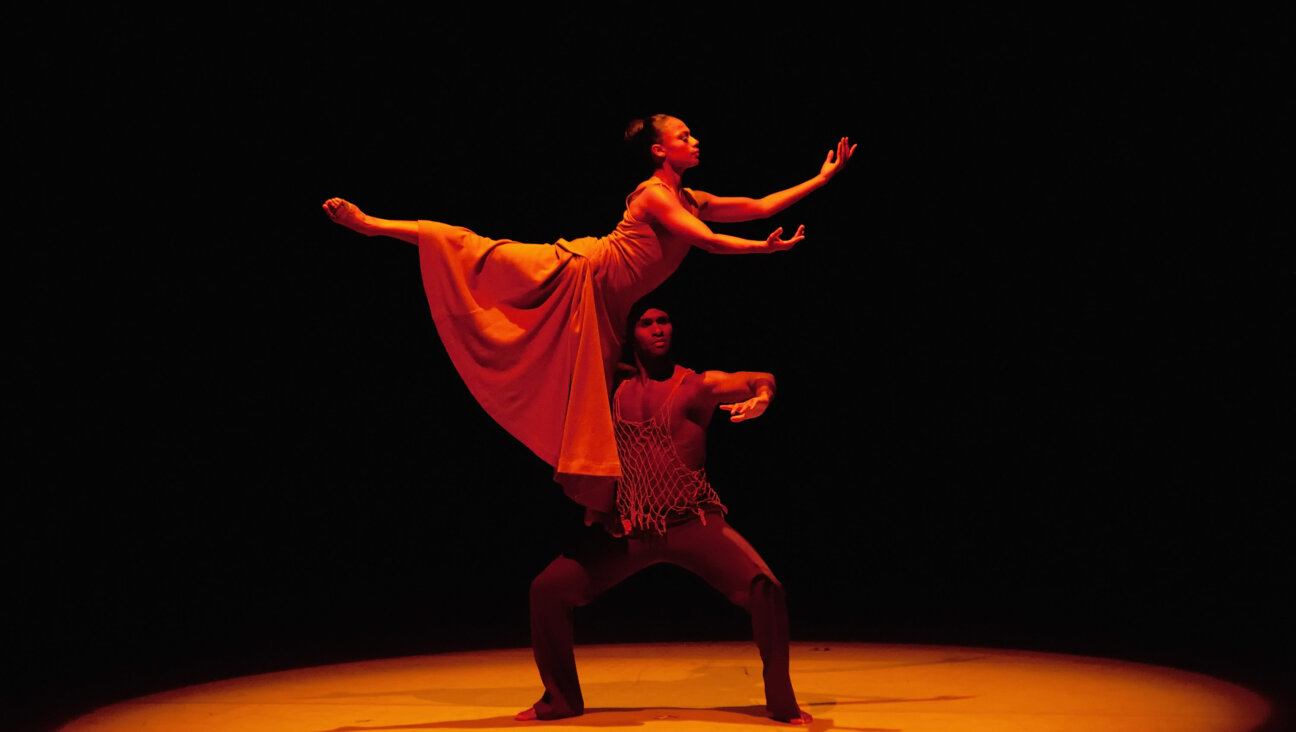Why the DNC should add a Palestinian speaker to tonight’s roster
‘Coach’ Walz and Kamala Harris should reverse the unforced error that sparked a sit-in overnight

Wednesday night, “Uncommitted” delegates to the DNC led a sit-in to demand a Palestinian-American be allowed to speak from the main stage. Photo by Jacob Kornbluh
CHICAGO — The coach-turned-candidate gave a rousing “pep talk” replete with sports metaphors as he accepted the Democratic vice presidential nomination Wednesday night: fourth quarter, down a field goal but carrying the ball, blocking and tackling. Meanwhile, just outside the doors of the United Center, a different sports metaphor was playing out — what they call in tennis an “unforced error” or in soccer, an “own goal.”
Delegates representing the 700,000 primary voters who cast “uncommitted” ballots to protest the Biden administration’s support of Israel’s war in Gaza had started a sit-in with a simple demand: That a Palestinian American join the panoply of people speaking from the convention’s mainstage, something that has, bafflingly, thus far been deemed out of bounds.
The Uncommitted movement has also called on Vice President Kamala Harris to back their call for an arms embargo on Israel, something that is — and should be — a nonstarter. But this should have been an easy layup for the Democratic National Committee and the Harris campaign:
Of course the convention, and the country, should hear from a Palestinian this week, just as they heard so powerfully Wednesday night from the parents of Hersh Goldberg-Polin, one of the 100-plus hostages still being held by Hamas in Gaza.
To deny the “uncommitted” movement’s demand flies in the face of the Democrats’ insistence that they are the party of inclusivity. It runs counter to the “freedom” message touted from the podium at the United Center, because freedom includes freedom of speech.
It also belies what Harris herself said she told Prime Minister Benjamin Netanyahu last month, days after President Joe Biden dropped out and, as our gold-medal track relay runners do, passed her the baton.
“We cannot look away in the face of these tragedies,” Harris said regarding what she called “the death of far too many innocent civilians” in Gaza. “We cannot allow ourselves to become numb to the suffering, and I will not be silent.”
So why won’t she and her team let Palestinians speak in Chicago?
I don’t know, because spokespeople for the DNC and the campaign did not respond to my inquiry on Thursday.
Waleed Shahid of the Uncommitted National Movement said that party and campaign officials were on site at the sit-in from its start at about 8:30 p.m. Wednesday until nearly 3 a.m. Thursday, trying to broker a solution with the dissident delegates. They offered meetings with junior Democratic staffers, Shahid said, and then with more senior staffers.
What they did not offer was a slot on the program tonight, which will culminate with Harris herself giving the most important speech of her life.
“It was so painful to watch their reactions,” Shahid added, tearing up as he spoke. “To not be able to get two minutes, three minutes, four minutes of speaking time on a stage of a party that professes equal rights for all.”
Shahid said his group has been asking for the DNC to feature a Palestinian-American speaker for about two months, and had submitted “countless names” as possibilities, including those of state lawmakers from Georgia, Illinois, Colorado and Virginia. He said the movement “fully supports” the decision to have Goldberg-Polin’s parents, Rachel and Jon, address the convention, but “to do so at the exclusion of the Palestinian-American experience feels like it doesn’t live up to the party’s values.”
Let me be clear: I understand the DNC cannot tolerate handing its stage over to critics who would trash Biden administration policy. But the “Uncommitted” leaders have said repeatedly this week that they want to urge their constituents to back Harris this fall. I’m sure the party’s speech-vetters could have found some acceptable language in which a Palestinian American politician could share their experience of the war. According to Shahid, nobody even tried.
After months of handwringing over how disputes over Israel and Gaza have threatened to divide Democrats, the war has been largely absent from the proceedings here this week. A pro-Palestinian protest on Monday drew only a few thousand people, a fraction of what organizers had predicted. Only a handful of mainstage speakers have mentioned the issue, generally calling for a ceasefire and release of hostages in the same breath. Pollsters and pundits say the war is unlikely to be a factor in November.
I agree this election is not, by any means, a referendum on Israel-Gaza, as some activists say. But that doesn’t mean we shouldn’t talk about it. And, as Harris told Netanyahu, that means not looking away from any aspect of it.
Democratic voters, and all Americans — and especially American Jews — can and should hear the testimony from Hersh’s parents and also from Palestinians whose relatives have been killed by Israeli airstrikes in Gaza. We can cry for and with both of them. It is the Jewish thing — and the human thing — to do.
Too many people on all sides of this conflict have tried over the last year to frame it as a sports game in which there will be a clear winner and a loser, and observers need to pick a team. This includes anti-Zionist activists who have tried to cancel Jewish authors, and wrongheaded college administrators who barred students from decorating their dorm-room doors. It includes Jewish leaders who say we are “unsafe” when we are actually just uncomfortable.
It should not include the Democratic — or Republican — Party. (No, the Republican convention last month in Milwaukee did not include any Palestinian speakers. So this is another chance for Harris to distinguish herself from her opponent.)
On Thursday, the United Auto Workers backed the Uncommitted delegates’ demand to platform a Palestinian speaker, and a group called Muslim Women for Harris disbanded over the Democrats’ refusal to do so.
Also tweeting in support of the sit-in was Alana Zeitchik, an Israeli-American who had several family members among the 240 hostages abducted on Oct. 7 — one of whom remains in captivity — and who appeared on last week’s “Jewish Women for Kamala” Zoom call.
“Rachel and Jon deserved every second on that stage,” Zeitchik wrote. “I also believe a Palestinian American voice deserves to be heard on that stage.”
The Goldberg-Polins were among some 40 speakers on Wednesday night, and more than 100 since the convention began. We’ve heard from actors and activists, relatives of the candidates, first-responders and “content creators,” former presidents (and their wives), even a pair of lead pipe removal activists and a basketball coach.
It’s not too late to add a Palestinian American to tonight’s roster.

















